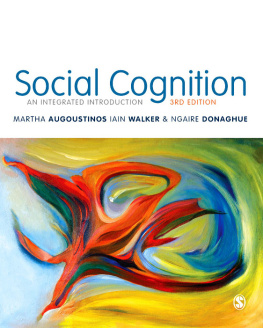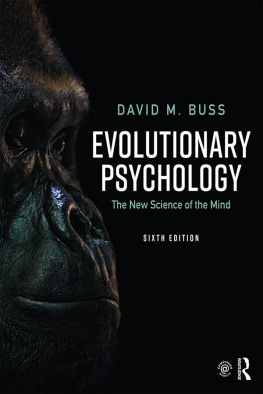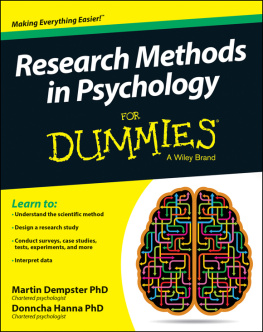Table of Contents
All in the Mind
Psychology for the Curious
Third Edition
Adrian Furnham and Dimitrios Tsivrikos
This third edition first published 2017 2017 John Wiley & Sons, Ltd
Edition history: Whurr Publishers Ltd (1e, 1996); Whurr Publishers Ltd (2e, 2001)
Registered OfficeJohn Wiley & Sons, Ltd, The Atrium, Southern Gate, Chichester, West Sussex, PO19 8SQ, UK
Editorial Offices350 Main Street, Malden, MA 021485020, USA9600 Garsington Road, Oxford, OX4 2DQ, UKThe Atrium, Southern Gate, Chichester, West Sussex, PO19 8SQ, UK
For details of our global editorial offices, for customer services, and for information about how to apply for permission to reuse the copyright material in this book please see our website at www.wiley.com/wileyblackwell.
The right of Adrian Furnham and Dimitrios Tsivrikos to be identified as the authors of this work has been asserted in accordance with the UK Copyright, Designs and Patents Act 1988.
All rights reserved. No part of this publication may be reproduced, stored in a retrieval system, or transmitted, in any form or by any means, electronic, mechanical, photocopying, recording or otherwise, except as permitted by the UK Copyright, Designs and Patents Act 1988, without the prior permission of the publisher.
Wiley also publishes its books in a variety of electronic formats. Some content that appears in print may not be available in electronic books.
Designations used by companies to distinguish their products are often claimed as trademarks. All brand names and product names used in this book are trade names, service marks, trademarks or registered ...
Chapter Descriptions
- Introduction: Public Beliefs About Psychology. A short and informative chapter that provides a jargonfree history of psychology and aims to demystify some of the main misconceptions related to psychology and psychological theorizing.
- Untangling Myths and Psychological Realities. This chapter explores a plethora of topics related to everyday psychological topics and how psychology has been portrayed or perceived by the general public. Topics range from how our brains work to a number of therapies used today and their actual impact. A candid and tothepoint chapter that equally educates and entertains.
- The Names and Dates That Shaped Psychologys History and Development. For about 150 years psychologists from many backgrounds, trained in many different areas, have investigated a wide range of psychological topics from memory to mating and personality to prejudice. This chapter summarizes some of the key works of prominent psychologists and showcases the impact of their work in our society. The information is provided in a playful and accessible manner.
- Science, PseudoScience, and Conspiracy Theories. This is a very applied chapter that looks into the very essence of how science is perceived, and how it operates within the remit of psychology. This link between science and science fiction creates an excellent platform to explore how psychology can help us investigate a number of conspiracy theories that populate our society and media alike.
- The Man Called Freud. Without doubt the most famous psychiatrist ever to have lived was Sigmund Freud. He remains, to this day, the most quoted of all psychologists or psychiatrists who did so much to shape how people in the 20th and 21st centuries see themselves. This chapter provides an insight into some of the key ideas that shaped psychology.
- A Guide Into Abnormal Psychology. This chapter is aimed at assisting the reader to understand the causes, development, and treatment of mental illnesses. This is an area that remains both important and controversial, with a number of public viewpoints and misconceptions. Covering topics such as schizophrenia and psychopathy, the chapter includes a number of key studies that allow novice readers to explore how psychologists use various diagnostic tools to detect and deal with mental health conditions.
- Psychology and Work. Working adults spend about onethird of their day at work (8 hours out of 24). Work is central to our lives and therefore of considerable interest to psychologists. This chapter explores how psychology is used to assist us in developing and managing employees at work. We explore issues of stress, burnout, and other key topics and conditions that people may be facing at work.
- Do Looks Matter? This is an important question, not least because it colors the way we examine the social impact of attractiveness, as well as questions concerning body image and body esteem. This chapter aims to explore which traits and characteristics best explain interpersonal attraction: that is, why people may be attracted to each other.
- Judging and Nudging. Psychologists have always been interested in how people make decisions. They are fascinated by peoples arationality and irrationality, unlike economists, who base many of their theories on people being logical and rational. Psychological research has shown a very long list of cognitive biases to which everyone is prone. These are errors people make in their everyday thinking. This chapter explores such errors and provides tips as to how to improve ones decisionmaking processes.
- A Psychologist in the Marketplace. Consumer psychology aims to examine how consumers in an individual and social context make purchase, consumption, and disposal decisions to satisfy both wants and needs. The growth of consumer psychology has mirrored that of advertising and the commercial sector in the Western hemisphere during the late 19th and early 20th centuries. Given such interest, we explore how individuals make decisions related to what they consume as well as the real impact that marketing and advertising may have upon our marketplace choices.
Preface to the Third Edition
The interest in psychology can be seen by the number of stories in every newspaper and blog. It is rare for a day to go by without a major news report sharing some new, interesting, and often counterintuitive finding from one or another branch of psychology, particularly neuroscience. Psychology books sell well.
This is not a textbook, nor is it a thematic book. It is a book for the curious. We have chosen topics that interest us and we hope the reader. In that sense it is quirky. We believe there are few competitors for a book like this and we are happy with that.
We have tried to be academically sound but also produce a readable text.
Adrian and Dimitrios
Acknowledgments
We have a number of research assistants to thank. Every year, for a quarter of a decade, we have had a placement student from Bath as a research assistant. With very few exceptions they have been a wonderful asset for us: clever, curious, and very computer literate; happy, honest, and hardworking; and good fun. We frequently ask them to search out material, critique something that we have written, tabulate findings, and so on. They do so with (apparent) enthusiasm and speed, and we are enormously grateful. Many of their efforts have gone into this book. Naming them in reverse order (that is, according to who worked with us most recently) they are Luke Treglown, Olivia Nettleton, Will Ritchie, Rebecca Milner, and Kate Telford.










